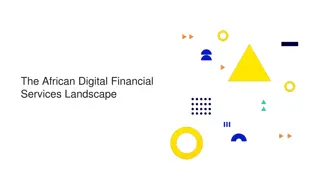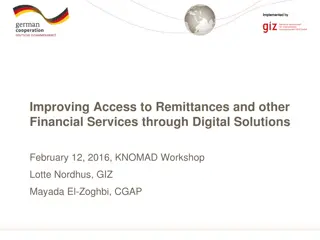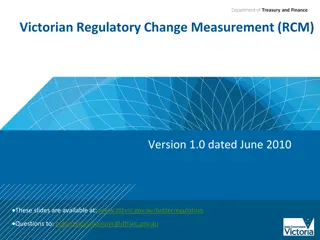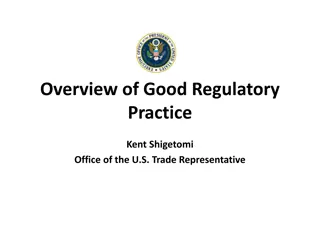Regulatory Mandates for Digital Financial Services: Challenges and Responses
Digital Financial Services offer a broad range of financial services through digital channels, promoting financial inclusion globally. However, regulatory challenges such as market entry, jurisdiction, data protection, and dealing with new technologies like cryptocurrencies require clear mandates and responses from regulators to ensure consumer protection and industry integrity.
Download Presentation

Please find below an Image/Link to download the presentation.
The content on the website is provided AS IS for your information and personal use only. It may not be sold, licensed, or shared on other websites without obtaining consent from the author.If you encounter any issues during the download, it is possible that the publisher has removed the file from their server.
You are allowed to download the files provided on this website for personal or commercial use, subject to the condition that they are used lawfully. All files are the property of their respective owners.
The content on the website is provided AS IS for your information and personal use only. It may not be sold, licensed, or shared on other websites without obtaining consent from the author.
E N D
Presentation Transcript
ITU Digital Consumer Forum 2019 Regulatory Mandates for Digital Financial Services Dr Charley Lewis
What is Money? Source: World Bank, 2017 Source: IMF, 2019
Digital Financial Services broad range of financial services accessed and delivered through digital channels, incl payments, credit, savings, remittances & insurance Mobile money (M-Pesa) Cryptocurrencies (BitCoin, Libra (?)) Promotes financial inclusion (banking the unbanked) Mobile money Two-sided platform market (users & agents) Globally: 272 services in 93 countries with 866 million customers (35% active) Africa: 132 services with 396 million accounts (37%) But still largely basic transfers & payments Considerable attention from: GSMA, UN, IMF, ITU
Financial Inclusion Source: World Bank, 2017 But 2/3 of unbanked adults have a mobile phone
Mobile Money Trends Source: GSMA, 2019 Source: GSMA, 2019
Mobile Money in Africa Source: GSMA, 2019 Source: GSMA, 2017
Challenges of DFS regulation Regulating market entry (licensing) Regulatory co-jurisdiction & co-ordination ICT sector, financial sector, competition, consumer protection Also DPAs, financial intelligence Need for clear, functional MoUs Data protection & privacy Service-based vs institution-based regulation Dealing with network effects - DFS as a platform service Imposing interoperability (Kenya) Dealing with cross-border DFS Regulatory sandboxes (consumer downside) Dealing with Unlicensed Digital Investment (ponzi) Schemes (UDIS) Implications of cryptocurrencies & blockchain (IMF, EU, Swiss, SARB)
Regulatory Responses Widening the regulatory net - to include? Imposing consumer protection codes of conduct Governance requirements for DFS firms Regulating data management & AI - data protection Specifying risk management requirements Requiring cybersecurity measures Endorsing industry codes Conducting research & producing issue reports & position papers Source: KPMG, 2019
DFS User Agreements: Consumer Protection Issues Language & transparency in communications / contracts Fees and charges Data protection vs 3rd party sharing (only 20%) Unilateral changes to terms and conditions Complaints handling Dispute resolution procedures incl mandatory arbitration (50% legal fees indemnity) Fraud & funds protection (only 50%) Reversal of erroneous transactions (only 6%) PIN safety warnings Dormancy period Customer funds at death
Thank you - questions? Charley@ICT-Policy.Africa























